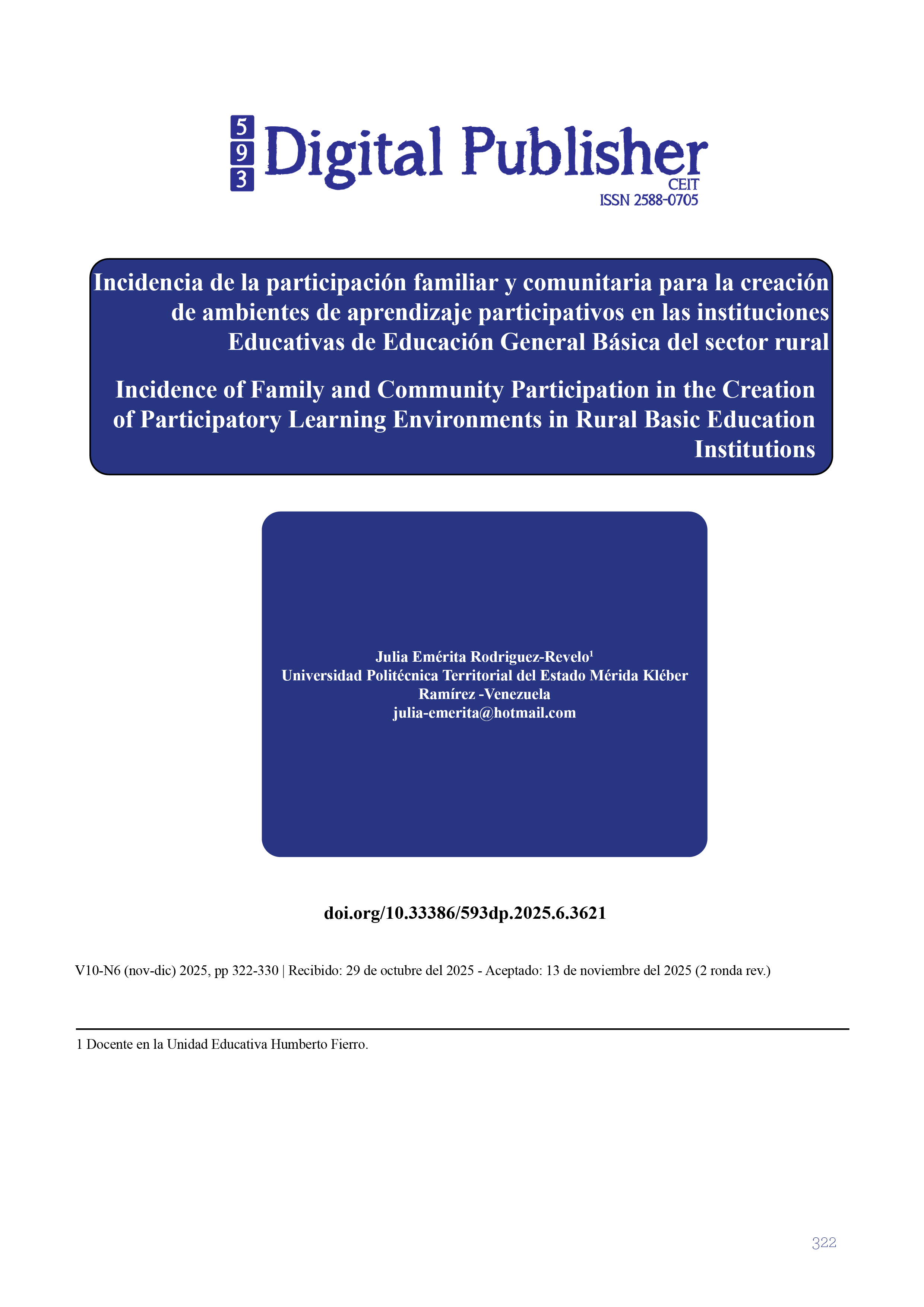Incidence of Family and Community Participation in the Creation of Participatory Learning Environments in Rural Basic Education Institutions
Main Article Content
Abstract
The study analyzes the impact of family and community participation on the creation of participatory learning environments in rural basic education institutions in Ecuador. Using a qualitative approach and a descriptive–explanatory design, semi-structured interviews, direct observations, and document analysis were conducted with teachers, parents, and community leaders from the “Ejército Ecuatoriano” Basic Education School. The results reveal that active family engagement and coordination with community actors strengthen student motivation, school retention, and institutional belonging. The most effective learning environments were those that integrated local knowledge, encouraged collaborative communication, and implemented contextualized learning projects. Economic and geographic constraints were identified as the main barriers to sustained parental involvement. The study concludes that rural education requires sustainable strategies linking schools, families, and communities, alongside public policies that reinforce educational co-responsibility. The findings provide empirical evidence to support participatory, culturally relevant, and socially inclusive pedagogical practices within the Latin American rural context.
Downloads
Article Details

This work is licensed under a Creative Commons Attribution-NonCommercial-ShareAlike 4.0 International License.
1. Derechos de autor
Las obras que se publican en 593 Digital Publisher CEIT están sujetas a los siguientes términos:
1.1. 593 Digital Publisher CEIT, conserva los derechos patrimoniales (copyright) de las obras publicadas, favorece y permite la reutilización de las mismas bajo la licencia Licencia Creative Commons 4.0 de Reconocimiento-NoComercial-CompartirIgual 4.0, por lo cual se pueden copiar, usar, difundir, transmitir y exponer públicamente, siempre que:
1.1.a. Se cite la autoría y fuente original de su publicación (revista, editorial, URL).
1.1.b. No se usen para fines comerciales u onerosos.
1.1.c. Se mencione la existencia y especificaciones de esta licencia de uso.
References
Broom, L., & Leggett, P. (2022). Family engagement and student motivation in low-resource schools. Education and Urban Society, 54(8), 1012–1031. https://doi.org/10.xxxxxx
CEPAL-UNESCO. (2022). Educación rural y equidad social en América Latina: Desafíos y perspectivas. Comisión Económica para América Latina y el Caribe. https://doi.org/10.xxxxxx
García, R., Torres, A., & Molina, F. (2023). Community-based learning and rural development in Latin America. International Review of Education, 69(4), 521–540. https://doi.org/10.xxxxxx
Gu, S., Li, Z., & Chen, L. (2024). Parental involvement and academic achievement in rural primary schools: A multilevel analysis. Children and Youth Services Review, 158, 107234. https://doi.org/10.xxxxxx
Jowsey, T., Lindsay, D., & Bassett, R. (2021). Collaborative learning and inclusion: Lessons from community schools. Teaching and Teacher Education, 104, 103392. https://doi.org/10.xxxxxx
Kumar, D., Al-Zoubi, S., & Torres, P. (2024). Community participation and educational quality in rural schools: Evidence from developing contexts. Educational Studies, 60(2), 187–205. https://doi.org/10.xxxxxx
Manrique, V., Paredes, M., & Silva, L. (2023). La corresponsabilidad familiar y su incidencia en el rendimiento escolar rural. Revista Latinoamericana de Educación Inclusiva, 17(2), 45–64. https://doi.org/10.xxxxxx
Maruyama, K., Rivera, J., & Darder, A. (2023). Culturally responsive pedagogy and participatory learning environments. Learning, Culture and Social Interaction, 38, 100669. https://doi.org/10.xxxxxx
Morowane, T. (2024). Socio-economic determinants of parental involvement in education. International Journal of Educational Research Open, 16, 100225. https://doi.org/10.xxxxxx
Ngozwana, N., Moyo, N., & Sibanda, S. (2024). Family-school partnerships for inclusive learning in rural Africa. Journal of Comparative Education and Development, 25(3), 211–229. https://doi.org/10.xxxxxx
Rivera, A. (2022). Gestión escolar y participación comunitaria en contextos rurales de América Latina. Revista Educación y Desarrollo Social, 16(3), 55–74. https://doi.org/10.xxxxxx
Ssekamwa, J. (2021). Teacher motivation and community participation in rural schooling. Compare: A Journal of Comparative and International Education, 51(6), 823–840. https://doi.org/10.xxxxxx
Tălmăcean, G. (2022). Collaborative classrooms and learner autonomy in rural education. International Journal of Educational Development, 91, 102578. https://doi.org/10.xxxxxx


